A Neglected Master: The Best of Henry Kuttner
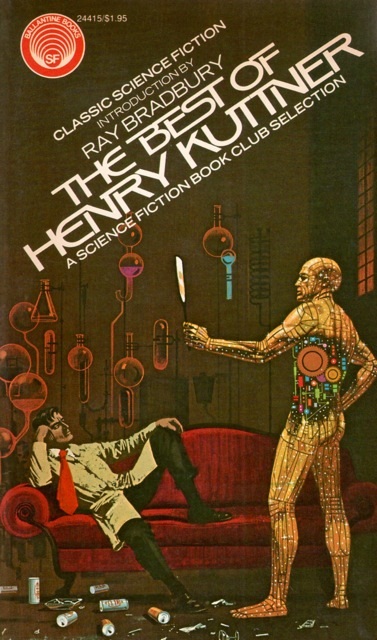 |
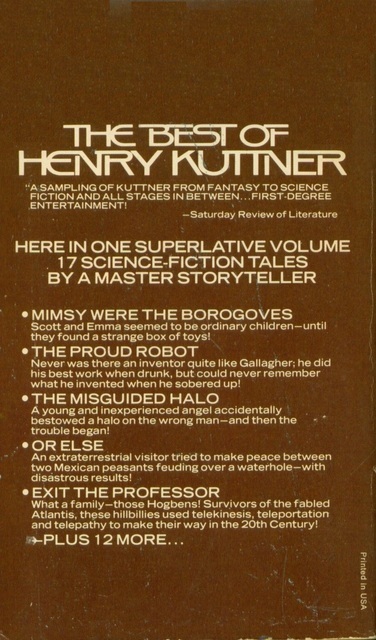 |
In Henry Kuttner’s short story “The Voice of the Lobster,” a character who is trying to escape some enemies muses to himself that he wishes he were a Cerean. In a footnote Kuttner includes the following: “The inhabitants of Ceres were long supposed to be invisible. Lately it has been discovered that Ceres has no inhabitants.” (p. 135).
Such is the typical humor of The Best of Henry Kuttner (1975), the fourth installment in Del Rey’s Classic Science Fiction Series. The previous volumes in this series all had insightful afterwords by the featured author, but Kuttner’s book does not contain one. Primarily, I take it, because Henry Kuttner (1915-1958) had already been dead for over a decade and a half by the time of publication. A shame though, given how the previous author afterwords in this series shed much light upon the subtext of their stories.
The introduction for this volume was done by the late and legendary Ray Bradbury (1920-2012). As with the previous three volumes, the cover art was by the amazing Dean Ellis (1920-2009).
Henry Kuttner was a giant in early, pulp, American, sci-fi writing. Several of his short stories, included in this volume, are considered classics of science fiction, as his inclusion in this series suggests. However, I first read him in various horror anthologies. My main knowledge of Kuttner was that he was part of the illustrious “Lovecraft Circle” — those early pulp writers who had been in letter correspondence with the horror writer H. P. Lovecraft (1890-1937) before he died.
Besides his own amazing work, and his association with Lovecraft, Kuttner is probably also most known for his marriage to the writer C. L. Moore (1911-1987), whom he also collaborated with. And who has her own volume in Del Rey’s Classic Science Fiction Series (stay tuned for that review in late January/early February 2017!).
Many of the writers in this series I was first introduced to by John O’Neill’s original posts here at Black Gate a few years ago. As I’ve said before, I was drawn in by the cover art of the books as well as the story recommendations. Though I was already familiar with Kuttner’s horror stories before, I was really excited to read this volume. The Best of Henry Kuttner did not disappoint and showed me a whole new side to Kuttner that I had not been familiar with. I agree with Bradbury’s assessment: Kuttner is a neglected master. I’ll review several of the stories here.
Science Fiction Book Club edition
The opening short story, “Mimsy Were the Borogroves,” is taken from a line of Lewis Carroll’s famous poem “Jabberwocky.” This is one of those time-travel-you-didn’t-see-the-ending-coming stories. But, in 2016 of course, you did see the ending coming because you’ve probably read dozens of time travel stories or seen enough time travel movies that have that same sort of “surprise” ending. Nevertheless, this is an inventive tale and I thought fairly scary at points. This story was apparently made into a 2007 movie called The Last Mimzy, which I haven’t heard the greatest things about.
“Two-Handed Engine” is about a future world where certain crimes are punished by death by robots. This was a chilling tale since the robots evidently follow you around for weeks or even months before killing you. Thus, the accused and condemned persons not only know that they are caught but they end up living the last days of their life constantly on edge not knowing when the robot will execute judgment. There is quite a bit of implicit commentary here concerning judicial systems that I won’t pursue. This was definitely a riveting tale though.
When I first read The Best of Henry Kuttner a few years ago, “The Proud Robot” was hands-down my favorite story (still one of my favorites). I rarely ever laugh out loud when I read comedic stories. But I absolutely busted out when the reason for why the scientist Gallegher had invented Joe the narcissistic robot is finally discovered (I will not spoil it for you). If you love stories about ingenious, alcoholic scientists and the surprises that await them after they sleep off a long night of drinking, “The Proud Robot” is right up your alley.
Another excellent comedy was “A Gnome There Was” about Crockett, a labor organizer, who in trying to rally support for a union among miners accidently stumbles upon a hidden, underground, gnome world. Appalled at the working and living conditions within the gnome community, Crockett seeks to get the gnome workers of the world to unite. The gnomes, who apparently love to fight, are not incredibly motivated to strike (in the labor union sense) against their emperor Podrang until Crockett hits upon an idea:
“You can’t be contented,” Crockett said desperately. “There’s more to life than — than digging.”
“Sure. There’s fighting. Podrang lets us fight whenever we want.”
Crockett had a sudden inspiration. “But that’s just it. He’s going to stop all fighting! He’s going to pass a new law forbidding fighting except to himself.”
In was an effective shot in the dark. Every gnome jumped.
“Stop — fighting!” That was Gru, angry and disbelieving. “Why, we’ve always fought.”
“Well, you’ll have to stop,” Crockett insisted.
“Won’t!”
“Exactly! Why should you? Every gnome’s entitled to life, liberty, and the pursuit of — of pugilism.” (p. 207).
Hilarity ensues.
“The Big Night,” on the other hand, was something of what I consider a classic sci-fi story. It’s about Logger Hilton, a space crewman and officer, who must decide what his destiny is concerning whether to stay with the old starship line or go on to a new career with more advanced but less romantic technology. There are some real poignant moments in this story against the backdrop of a seemingly indifferent space, i.e. the big night. This was one of Kuttner’s more moving tales. The characterization here is highly believable and the human situations are, despite the sci-fi trappings, quite lifelike. If you had to pick only one tale out of this anthology, I highly recommend reading this one.
Back to a lighter side, “Exit the Professor” and “Cold War” were two comedies centered upon a family of magic-users called the Hogbens. This cadre of mountain folk have an “aw-shucks” vocabulary and simplicity that masks their advanced sorcerous abilities.
We Hogbens are right exclusive. That Perfesser feller from the city might have known that, but he come busting in without an invite, and I don’t figger he had call to complain afterward. In Kaintuck the polite thing is to stick to your own hill of beans and not come nosing around where you’re not wanted (p. 152).
Though devious to some extent, the Hogbens are hard not to like in their unpretentious and funny ways.
I knew what I wanted to do, all right, but if Galbraith [the mischief-maker “Perfesser”] had asked me why I was twisting wire here and bending a whozis there I couldn’t of told him. I got no eddication. Only now I knew the gadget would do what I wanted it to do (p. 160).
It’s clear that Kuttner is basing the Hogbens on the Whateley family of Lovecraft’s “The Dunwich Horror,” which features a rural family of evil wizards. Lovecraft’s story is clearly horror. But Kuttner’s stories here are clearly comedic, and effectively so.
“Or Else” is a very interesting tale. An alien lands his flying saucer in the Mexican desert (sometime in the late 19th century?) between two hombres having a shootout over waterhole rights. The alien, in typical advanced alien form, seeks to bring peace to Earth, and particularly peace to these two Mexicans. Why? Because that’s what advanced, super-rational beings do. This was also a funny tale. The amazingness of seeing an alien and his ship are ludicrously put alongside of two poor peasants who don’t seem to have much time for the seemingly miraculous. For example, the one Mexican suspects the alien is actually an American with some fancy, flying coach he’s never seen before. When the alien leaves, flying north, we get: “As I thought,” Miguel said. “He was from los estados unidos.”—Funny!
But Kuttner’s ending in this comedy is very insightful showing that peace does not come about by mere logic or force. Some other element seems to be required. The alien warns the Mexicans to practice peace, and claims he’ll return to make sure that they do just that, or else! But, after he leaves, the Mexicans resume shooting at each other. Pausing behind a rock Miguel sees a road runner bird eating a lizard and begins to say to the bird almost the exact words the alien had earlier said to him and the other Mexican:
“Stop eating lizards, Senor Bird. Stop, or I must kill you.”
The road runner ran on across the rifle sights.
“Don’t you understand how to stop?” Miguel called gently. “Must I explain how?”
The road runner paused. The tail of the lizard disappeared completely.
“Oh, very well,” Miguel said. “When I find out how a road runner can stop eating lizards and still live, then I will tell you, amigo. But until then, go with God.”
He turned and aimed the rifle across the valley again.” (pgs. 333-334).
Another very poignant tale is “What You Need.” After I read it I realized that I had seen a Twilight Zone episode of this story (season 1, episode 12, originally aired on December 25, 1959 — thank you Wikipedia!). It’s a memorable episode. In fact, I think Rod Serling’s adaptation improves upon Kuttner’s original story. But, still a good story, and I’m sure that’s why Serling picked it for his show.
“Absalom,” the last story in this book, is about the evolution of the human race becoming a super-human race. Joel Locke, who was himself a child prodigy, is father to Absalom. Absalom is one of a growing population of child prodigies who go beyond anything seen before. But Locke seeks to hold back Absalom from certain advanced studies because—so he claims—he’s seeking the best for his son. But Absalom, though a child, claims through his advanced studies of psychology that his father actually fears him (as Locke’s father before him had feared Locke) and just seeks to hold him back. Absalom deceptively drugs his father and then for the rest of the story keeps him in submission through a constant enforced drug stupor. Absalom goes on to his advanced studies claiming that, deep down, his father really hates him (even before the enforced drug stupor). The story chillingly ends with Locke thinking with a “secret satisfaction”: “Some day Absalom would have a son.” (Sidenote: Absalom was the name of the Israelite King David’s son who betrayed him.)
Not all of Kuttner’s stories here are the greatest though. “The Misguided Halo” was a bit of a silly story about a heavenly gift being delivered to the wrong address. Cute and funny at parts, but it felt more like a filler story that had to meet a deadline than anything else. To say the least, the results are more hellish than heavenly! And I thought “The Voice of the Lobster” was probably the least-best story here. It was a little confusing and not all that interesting.
Nevertheless, overall this was an excellent anthology of stories. Given that I was familiar with Kuttner’s horror stories, the most surprising thing about this volume was just how funny Kuttner could be. I also was often intrigued by the characters and situations presented in many of Kuttner’s stories. He could clearly present a very moving and authentic tale within a sci-fi setting.
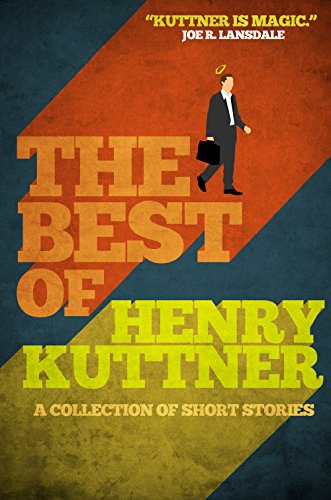 |
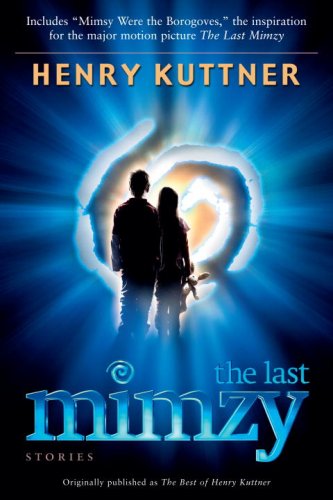 |
The Best of Henry Kuttner was published by Ballantine Books in April 1975. It is 413 pages, priced at $1.95 in paperback. The cover is by Dean Ellis. The Science Fiction Book Club hardcover edition was published in February 1975. The first ebook version (above left) was published by Diversion Books in April 2014. The last print edition, retitlted The Last Mimzy: Stories (above right), was published by Del Rey in March 2007 to tie in with the 2077 film of the same name (an adaptation of “Mimsy Were the Borogoves”) from New Line Cinema.
I have really liked all of the previous volumes I’ve reviewed in the Del Rey’s Classic Science Fiction Series. But The Best of Henry Kuttner is (thus far) my favorite volume in this series. I highly recommend it, and Kuttner’s other stories. For, as the late Ray Bradbury said over forty years ago and I think is still true today, Henry Kuttner is clearly a neglected master.
Here’s the complete Table of Contents:
Henry Kuttner: A Neglected Master, introduction by Ray Bradbury
“Mimsy Were the Borogoves” (Astounding, February 1943)
“Two-Handed Engine” (F&SF, August 1955)
“The Proud Robot” (Astounding, October 1943)
“The Misguided Halo” (Unknown, August 1939)
“The Voice of the Lobster” (Thrilling Wonder Stories, February 1950)
“Exit the Professor” (Thrilling Wonder Stories, October 1947)
“The Twonky” (Astounding, September 1942)
“A Gnome There Was” (Unknown, October 1941)
“The Big Night” (Thrilling Wonder Stories, June 1947)
“Nothing But Gingerbread Left” (Astounding, January 1943)
“The Iron Standard” (Astounding, December 1943)
“Cold War” (Thrilling Wonder Stories, October 1949)
“Or Else” (Amazing Stories, August/September 1953)
“Endowment Policy” (Astounding, August 1943)
“Housing Problem” (Charm, October 1944)
“What You Need” (Astounding, October 1945)
“Absalom” (Startling Stories, Fall 1946)
Our previous coverage of the Classics of Science Fiction line includes (in order of publication):
- Rich Playboys, Mad Scientists, and Venusian Monsters: The Best of Stanley Weinbaum by James McGlothlin (1974)
- A Neglected Master: The Best of Henry Kuttner by James McGlothlin (1975)
- A Shaper of Myths: The Best of Cordwainer Smith by James McGlothlin (1975)
- Smugglers, Alien Vampires, and Dark Dimensions: The Best of C. L. Moore by James McGlothlin (1976)
- Space Colonies, Interstellar Fleets, and The Martian in the Attic: The Best of Frederik Pohl by James McGlothlin (1976)
- Classic SF from One of the Twentieth Century’s Great Masters: The Best of John W. Campbell by James McGlothlin (1976)
- Shark Ships and Marching Morons: The Best of C. M. Kornbluth by James McGlothlin (1977)
- Drawing Out What it Truly Means to be Human: The Best of Philip K. Dick by James McGlothlin (1977)
- Wit and Play in Classic Science Fiction: The Best of Fredric Brown by James McGlothlin (1977)
- Wings, Wind, and World-Wreckers: The Best of Edmond Hamilton by Ryan Harvey (1977)
- Dead Cities, Space Outlaws, and Planet Gods: The Best of Leigh Brackett by Ryan Harvey (1977)
- From the Pen of a Great Pulpster: The Best of Robert Bloch by James McGlothlin (1977)
- Germ Warfare, Sentient Planets, and Dark Age Alchemy: The Best of Murray Leinster by James McGlothlin (1978)
- Dinosaurs, Mermaids, and Haunted Lumber: The Best of L. Sprague De Camp, by James McGlothlin (1978)
- The Best of Jack Williamson by John O’Neill (1978)
- Davey Jones, Alien Spores, and Riding on a Comet: The Best of Raymond Z. Gallun by James McGlothlin (1978)
- Gods, Robots, and Man: The Best of Lester del Rey by Jason McGregor (1978)
- Space Empires, Ruined Civilizations, and Lovable Aliens: The Best of Eric Frank Russell by James McGlothlin (1978)
- The Best of Hal Clement by John O’Neill (1979)
- The Best of James Blish by John O’Neill (1979)
- Vampires, Frozen Worlds, and Gambling With the Devil: The Best of Fritz Leiber by James McGlothlin (1979)
- The Best of John Brunner by John O’Neill (1988)
See all of our recent Vintage Treasures here.
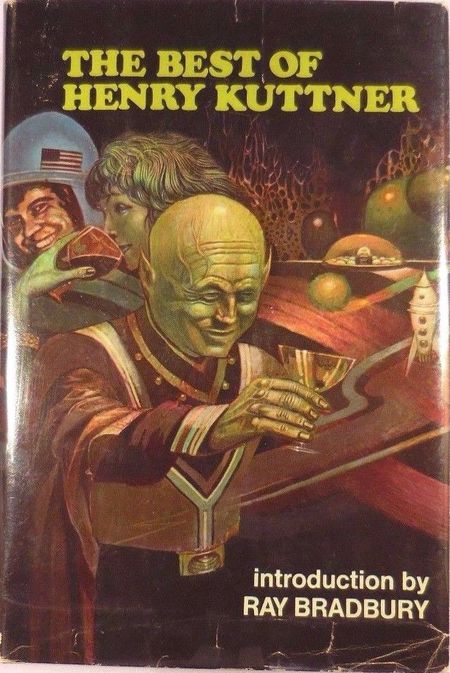
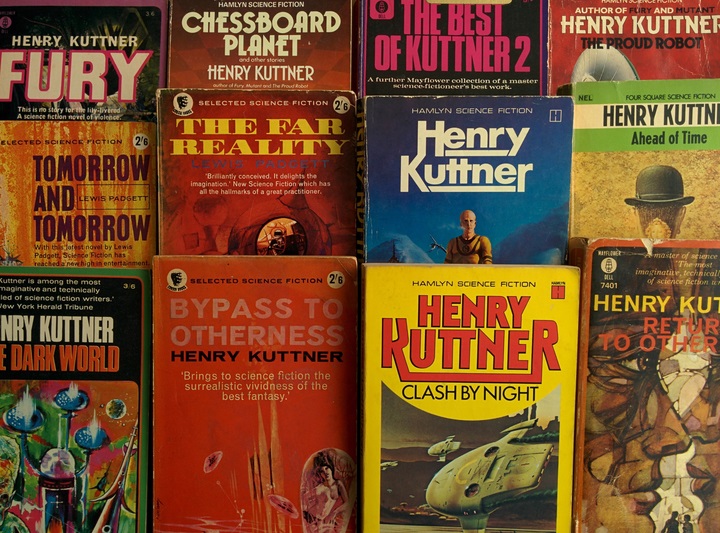
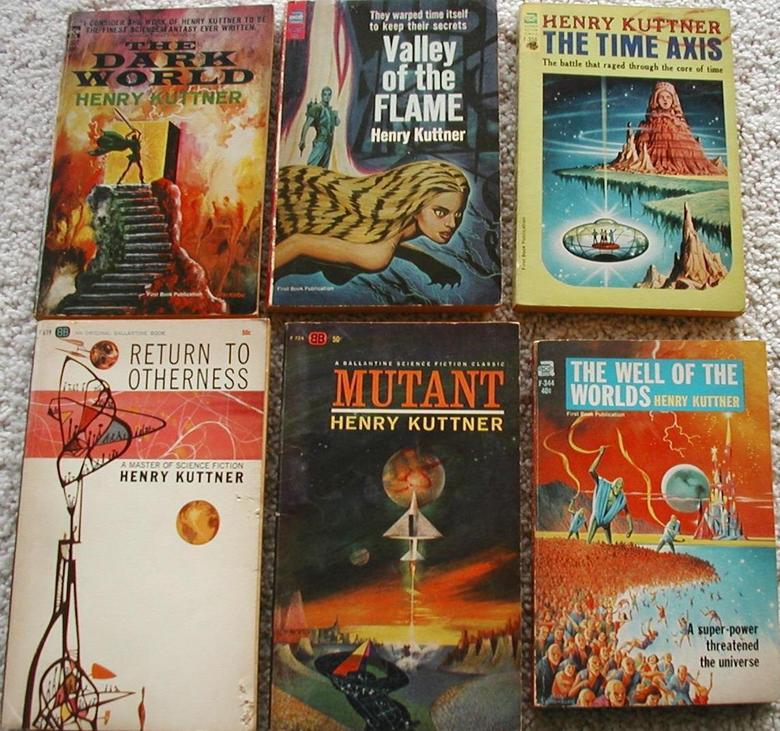
I’ve read a lot of Kuttner over the years, and after a while I started to think that he sounded a lot like Ray Bradbury — before Bradbury himself had a sound.
Not that the two are identical, but you can definitely see that Kuttner had a huge influence on the younger writer.
Henry Kuttner also wrote mystery novels that are worth reading.
That footnote from “The Voice of the Lobster” sold me — a bit of humor on the lines of Douglas Adams or Pratchett! Made me laugh out loud. And then I go on to read that this was from the “least-best” story in the book! I’ve definitely got to hunt down a copy.
@HAJ: Though I’ve read Bradbury at various times throughout my years, I have to say that I’m not familiar enough with the “feel” of Bradbury to detect him in Kuttner. I’m sure you’re correct though.
@kelleyg: I wasn’t aware of that. Thanks for letting me know. It seems Mr. Kuttner was a jack-of-all-genres!
@Nick: I perhaps didn’t state that the best. “The Voice of the Lobster” was still good. I just didn’t think it stood out very well against the majority of the collection.
> I’ve read a lot of Kuttner over the years, and after a while I started to think that he sounded a lot like Ray Bradbury — before Bradbury himself had a sound.
Howard,
I never noticed the similarity! I’ll have to keep an eye out for it next time I settle in with an early Kuttner book.
> That footnote from “The Voice of the Lobster” sold me — a bit of humor on the lines of Douglas Adams or Pratchett! Made me laugh out loud.
Nick,
I know exactly what you mean!
I’m fairly sure he was a big influence on Bradbury, to whom he was a mentor. And Zelazny was a fan as well, going so far as to say that Kuttner’s The Dark World was an influence on the Chronicles of Amber. The character Ganelon, who hangs out with Corwin starting with the second book, is named after Kuttner’s character, Ganelon, from The Dark World.
I have been a Henry Kuttner fan, well, forever, since reading “Mimsy Were the Borogroves” in The Science Fiction Hall of Fame, Vol. 1. Of course, that story is a “Lewis Padgett”, so Catherine Moore gets equal credit for it.
One of my favorite Kuttner tales is “Happy Ending”, which is exactly what it says it is, and yet is not, in a story told ending->middle->beginning.
@Eugene: I didn’t feel I had enough room in this post to expand upon his collaborations with Moore, though I did comment that they did indeed collaborate on stories together.
However, I was not aware that “Mimsy Were the Borogroves” was co-authored with his wife. Which is striking given that this is considered one of his signature stories (i.e. Del Ray put it first in this anthology). That seems less than ingenuous to present it as Kuttner’s own work.
Perhaps Bradbury made a comment about Moore co-authoring this story and I just missed it. Still, it seems that a book entitled The Best of Henry Kuttner would have stories that were authored by Kuttner alone. I’d have to go back the book to see if Moore is given a credit on the title page or TOC. If she’s not, that’s even more suspicious.
I mean to cast no aspersions on Mr. Kuttner’s legacy as a formidable sf author. The cyphering out of which partner wrote which “Lewis Padgett” or “Lawrence O’Donnell” story is beyond my literary skills, certainly. But, most histories of sf and biographies of Mr. Kuttner, such as the SF Encyclopedia‘s entry on him, do acknowledge that much of his work and some part of Ms. Moore’s work was collaborative, as they found it easy to co-write and edit each other’s works-in-progress.
“Mimsy” falls into the period in which they were actively co-writing, so I usually assume that Ms. Moore at least had an “editor” credit due with regard to the story. And if not, well, she is due the respect anyway, having had several of her “Lawrence O’Donnell” works, such as Clash by Night attributed solely to Mr. Kuttner.
In any case, they both rightly shared the 2004 Cordwainer Smith Rediscovery Award. And I guess I just prefer to think of them as partners, both in life and in literature.
Eugene, I’ll admit that my historical research on Kuttner (which was limited to Wikipedia and a few other online places) did not really highlight Kuttner’s works as always, or even usually, being the result of Moore’s influence.
That being said, I know most authors admit that none of their stories drop from some sort of artistic vacuum. Not just in influences, but many authors admit that their friends and colleagues read drafts and give input.
If a writer is married to a writer, I just assume that the spouse gave input. And, of course, a collaboration is more “influence” than simple input.
Thanks for this wonderful review of one of my favorite writers and books! I will disagree on one point—I don’t quite think the Hogbens are sorcerers, rather their abilities are a lost science they brought from Atlantis, their old home country (“Not the old Old Country. That got sunk.”)
For years, I’ve been trying to find the story with that line (“sunk”). After reading your post, I thought it was in this book… But I didn’t see it, and Kindle’s minimal “search” facility couldn’t find it in the e-book. Would you mind pointing me to it, please? Thanks!
Found it!
It’s in “See You Later”, around page 2. The quote is:
“Course I don’t mean the real old country. That got sunk.”
Thanks for inspiring me to look again!
I found it on fadedpage.com, which has scans of books/stories/magazines that are public domain according to Canadian copyright law.